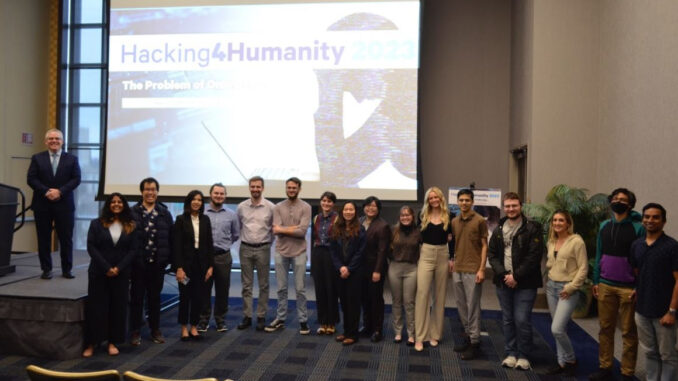
Megan Trotter | News Editor
The Grefenstette Center for Ethics in Science, Technology and Law’s hackathon returns to the Bluff for the annual “Hacking4Humanity” technology and policy hybrid event’s 2024 kickoff on Feb. 9.
This will be the hackathon’s second year combining the efforts with University of Pittsburgh and Carnegie Mellon. Students have the opportunity to base their projects off of two tracks. The first is technology dealing with problems created through things like apps, robotics or designs, and the second is policy, which focuses on federal, local, regional and corporate issues.
With four additional organizers including Pitt Cyber: The Institute for Cyber Law, Policy and Security; The Center for Informed Democracy and Social-cybersecurity Research Group; The Collaboratory Against Hate Research Group; and The Sara Fine Institute, this is the first year the hackathon is open to undergraduate students across the entire Pittsburgh area.
Students can compete as individuals or teams up to four.
John Slattery, director of the Grefenstette Center, said that this year some of the event’s kinks have been ironed out to simplify instructions for competitor clarity and so “everybody can know what they have to build and have a really good time doing it.”
The event will provide networking experiences with guest judges including Annie Newman, the director of digital strategy for Gov. Josh Shapiro, Jonathan Rubin, an engineering manager for Google and Chad Heitzenrater, the senior information scientist at RAND Corporation.
“There’ll be sort of a break. And then the guest judges will actually come back and have a bit of a conversation. So we’ll talk about what they do [and] how they work with technology on a daily basis,” Slattery said.
So far, the event has over 50 registrations, with about one-third of the students attending from Duquesne. In the 2023 competition, most Duquesne students entered the hackathon individually.
One of Slattery’s hopes for the 2024 hackathon is to provide students with the opportunity to have their ideas picked up by the judges and advisors with the intention of moving toward the next steps and eventual implementation.
“Our main goal for all the students that win any prizes is to, especially if they’re not seniors, to keep that work going in the fall,” Slattery said. “Then just to slowly partner with other technology companies [and] with development companies to help to get these ideas and push them out into the real world.”
Last year, Duquesne runners-up Tessa Datte and Emily Brozeski, also known as Team Hater Deflators, received a Common Good Award in the policy track for their project “Redesigning Send.”
The premise of their project was to redesign the send button to show both profile icons “meeting” as you swipe to press send.
“We really researched just our human patterns and what our interactions look like. We wanted to focus on bringing empathy and an emotional response to our digital world that can sometimes be perceived to have a lack of consequences,” Datte said.
This year, top entries in technology and policy will each receive $500 and second place entries each will receive $200.
Slattery said this event is a good opportunity for undergraduates to fulfill course requirements.
“As most undergrads should know, everyone’s required to do an ELO [experiential learning opportunity],” Slattery said. “This is the first year that The Grefenstette Center has started the ELO.”
To complete the experiential learning (otherwise known as a Capstone) opportunity requirement students must present a poster at the fall symposium and participate in the spring hackathon.
“That’s also a part of trying to connect more students to this work of ethics of technology,” Slattery said.
“It was a cool opportunity to just be in this community and get to just practice and have fun like what we do,” Datte said. “It was also awesome that all different schools could come.”
The event will be both livestreamed online and held in-person at Duquesne’s Power Center. It is open to anyone who would like to attend.
Hacking4Humanity will accept new registrations up until the kickoff at 1 p.m. on Feb. 9. To register visit duq.edu/ethics.
